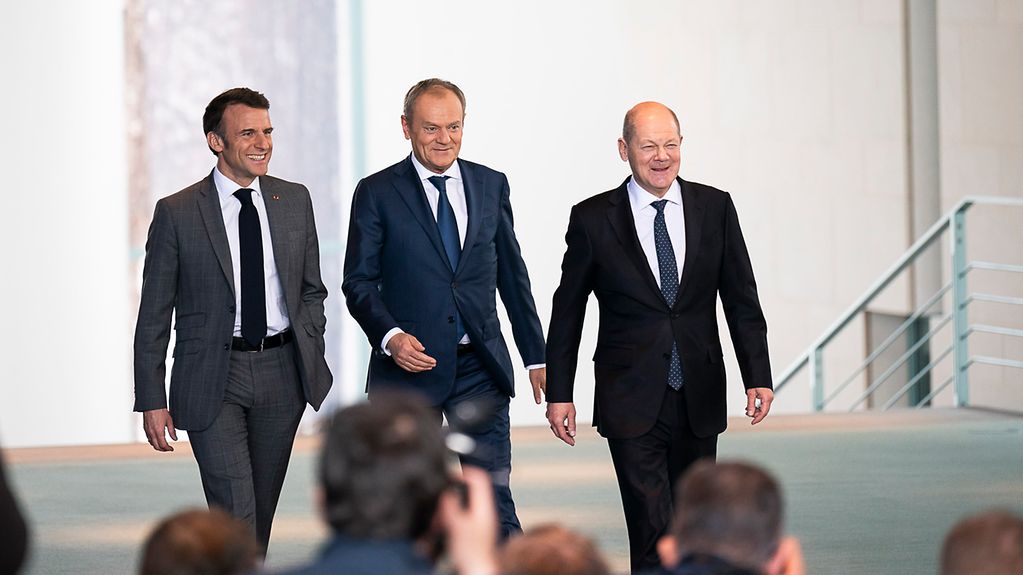Weimar Triangle meeting
Germany, France and Poland are standing resolutely by Ukraine's side, stressed Federal Chancellor Scholz during his meeting with President Macron and Prime Minister Tusk. He pointed out that the three countries would not slacken in their efforts to support the country as it defends itself against Russia's attack.
3 min reading time

Olaf Scholz with Emmanuel Macron and Donald Tusk: the Weimar Triangle states are among Ukraine’s greatest political, military and financial supporters.
Photo: Federal Government/Kugler
Federal Chancellor Scholz said he was pleased that this first meeting of the Weimar Triangle with the new Polish Prime Minister Donald Tusk could be arranged. “France, Germany, Poland: the Weimar Triangle in the heart of Europe is a vital sign of our unity. And unity is so important,” said Scholz following the meeting with Tusk and the French President Emmanuel Macron in the Chancellery.
Helping Ukraine defend itself
The three Weimar Triangle states are among Ukraine’s greatest political, military and financial supporters in the country’s fight against the imperialist aggressor Russia. “We are standing shoulder to shoulder with Ukraine, closely and steadfastly. We’ve been making this clear from the start, and it still holds true. For as long as it takes.”
Scholz also pointed out that, while there was no question about this support for Ukraine, it was just as clear that the Weimar Triangle states would not go to war against Russia themselves. He added that the ongoing joint goal was to ensure that Ukraine remained able to effectively defend itself against Russian aggression. To this end, Germany, France and Poland were cooperating with many allies and partners across Europe and on the other side of the Atlantic, the Federal Chancellor said. “We will not waver in our commitment,” Scholz stated clearly.
Expanding support
Building on the results of the Support for Ukraine conference in Paris, the meeting in Berlin focussed on ways to support Ukraine even more effectively. The Federal Chancellor listed a few focus areas the heads of state agreed on. These include...
- ... sourcing even more arms for Ukraine on the entire global market.
- ... increasing the production of military equipment, including by cooperating with partners in Ukraine.
- ... establishing a new skills coalition for long-range rocket artillery through the “Ramstein Format”.
- ... intensifying support also at a European Union level. To this end, the European Peace Facility would receive 5 billion euros for further military support for Ukraine this year and for strengthening the EU training mission, Scholz explained.
- ... using windfall profit from Russian assets frozen in Europe to provide financial support for purchasing arms for Ukraine.
Solidarity for peace
“You can tell that the three of us are serious about supporting Ukraine,” Scholz said. Solidarity and joint action were indispensable, the Federal Chancellor stressed, when it came to defending peace and freedom in Europe.
He added that it was true more than ever before that “Our strength lies in unity. Our three states – Germany, Poland and France – in particular have a special responsibility in this context.” Ukraine’s President Zelensky “knows that he can rely on us, and we are renewing this pledge of support for Kyiv today,” the Federal Chancellor said.
Signal to Moscow
The Federal Chancellor pointed out that a crystal clear signal was being sent to Moscow: “We want the Russian President to know that we will not let up in our support of Ukraine! We are standing shoulder to shoulder with the Ukrainian people, steadfast and united.”
The Weimar Triangle dialogue platform was launched in 1991 at the initiative of the Federal Government. On 28 August 1991, the birthday of poet Johann Wolfgang von Goethe, the then Foreign Ministers of Germany, France and Poland – Hans-Dietrich Genscher, Roland Dumas and Krzysztof Skubiszewski – met in Weimar for the first meeting in this format. Their goal was to identify shared fundamental interests for the future of Europe and to further develop cooperation across borders.